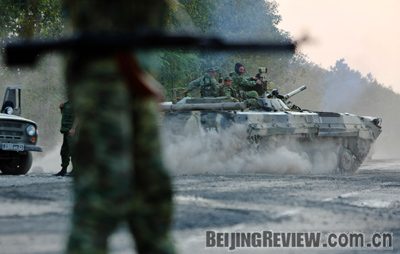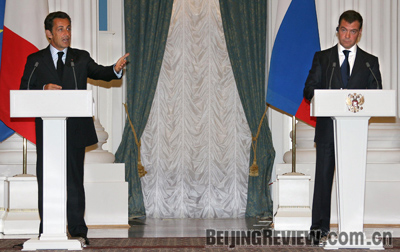|

LEAVING GEORGIA: Russian troops withdraw from their sentry point about 20 km
from Geli, an important strategic site in Georgia, on August 22
After the military conflict between Russia and Georgia over South Ossetia, Moscow recognized the independence of South Ossetia and Abkhazia, two breakaway republics from Georgia. Russia's behavior drew criticism from Western countries, which have mostly sided with Georgian President Mikhail Saakashvili. Tension between Russia and the West has increased over the issue.
Faced with this international pressure, in an August 31 television interview, Medvedev laid out five principles which he said would guide Russian foreign policy in the future.
Implications of the principles
It was no accident that Medvedev chose the primacy of international law as the first principle. He knew how the international community would react when Russia crossed the Georgian border and recognized the two breakaway republics as independent.
The multipolarity principle reflects Russia's longstanding view. In 1997, Russia and China issued a joint statement declaring their commitment to a multipolar world. The two countries reaffirmed their stance in 2005. "We cannot accept a world order in which all decisions are taken by one country, even such a serious and authoritative country as the United States of America," Medvedev said in the interview. "This kind of world is unstable and fraught with conflict."
The third principle, maintaining friendly international relations, was meant to reassure the European Union (EU) and serve as a warning to the Commonwealth of Independent States (CIS) countries that are trying to join the North Atlantic Treaty Organization (NATO). Both Medvedev and Prime Minister Vladimir Putin praised the EU for its decision not to impose sanctions on Russia, although Europe did suspend talks on a strategic pact. Prior to the emergency summit held by EU countries on September 1, Putin called on them to make decisions based on European interests rather than U.S. demands.
History necessitated the fourth principle, protecting Russian citizens at home and abroad. Over the past 70 years, the Russian people have settled throughout the CIS countries and Baltic Sea area. Since the Soviet Union disintegrated in 1991, they have found themselves caught up in border disputes and other issues.
Like other countries, Medvedev said, Russia has "privileged interests" in regions outside its borders. "In these regions, there are countries with which we have traditionally friendly cordial relations, historically special relations," he said. "We will work very attentively in these regions and develop these friendly relations with these states, with our close neighbors." In other words, Russia is planning to reassert its influence in strategic regions like Africa and Latin America.

CALL FOR PEACE: Russian President Dmitry Medvedev and French President Nicolas
Sarkozy appear at a joint press conference on August 12 in Moscow. The conflict ended when
Russia and Georgia accepted Sarkozy’s six-point ceasefire agreement.
Although Medvedev declared as "irreversible" Russia's decision to recognize the two breakaway republics' independence, he exhibited some flexibility and openness. He said that Russia's future diplomatic relations would depend not only on Russia, but also on its friends and partners in the international community. The president also said that although Russia does not support diplomatic or economic sanctions in general, the government could adopt the special laws necessary to impose them on other countries.
A balance between principle and interest
The five principles represent Russia's response to U.S.-led NATO enlargement, which is creeping ever closer to its borders. Through these principles, Russia hopes to strike a balance between observing basic principles of international law and protecting its own interests.
| 